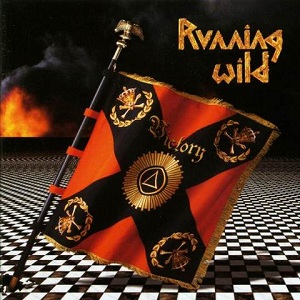 Running Wild is known as “that band with pirate-themed lyrics”, but that’s the least interesting thing about them. One of the early German power metal bands, they’re a striking case of musical taxidermy. They got their sound figured out in 1986, or dunked it in a tank of preservatives, and thirty years later they’re still playing it. No new ideas allowed!
Running Wild is known as “that band with pirate-themed lyrics”, but that’s the least interesting thing about them. One of the early German power metal bands, they’re a striking case of musical taxidermy. They got their sound figured out in 1986, or dunked it in a tank of preservatives, and thirty years later they’re still playing it. No new ideas allowed!
No other band has hewn to a sound this hard or this long. Helloween went through a Beatles period. Accept went through a hair metal period. Rage has played every single metal genre under the sun. But Running Wild now has a streak of thirteen albums that, on a sonic level, all pretty much sound the same. When Otto the school bus driver complains about bands ripping off Priest, this is the one he’s talking about.
Sadly, the quality level started dropping around 1995 or so. You can only photocopy your ass cheeks so many times before the printouts get all faded and weak, and that seems to be happening to Running Wild. Depending on who you ask, 2000’s Victory is either “the last vaguely good album” or “the first legitimately bad one.”
Myself, I like it. It lacks the epic, exploratory quality of their early 90s work, but it’s has a disciplined, martial aesthetic. The songs are short, punchy, and to the point, like parade drills. Part of it is songwriting. Part of it is the ultra-mechanical production, bolstered by a drum machine (Rolf Kasparek had the chutzpah to claim that the drumming was a friend who didn’t want to be credited).
Obviously there’s enough filler for a Tempurpedic mattress. I don’t know if I needed a Beatles cover. “The Fall of Dorkas”, “Silent Killer”, “Into the Fire”…boring, boring, boring. Running Wild has a unique talent for writing songs that induce narcolepsy without actually coming off as bad, and that side of the band is on full display here.
But I don’t care, because there’s enough highlights to wake you back up again. “When Time Runs Out” has an evocative main lead melody that reminds me of “Rock Hard, Ride Free”. “Return of the Gods” could be titled “Return of the Goods”.
The album’s two greatest cuts are “Hussar”, taking us from the Spanish main to a couple hundred miles inland, and “Victory”, where Rolf Kasparek displays his penchant for snaking, pentatonic alt-picking. Running Wild has an interesting conflict at its heart: they are generic as they come and unapologetic 80s revivalists, but they have a singular sound that’s entirely their own – nobody writes riffs like Running Wild, unless they’re trying to sound like Running Wild (and usually not even then.)
Don’t let a Beatles cover and a nonexistent drummer put you off. This is unequivocally one for the “good RW” table, and it’s not seated at the foot, either.
No Comments »
Comments are moderated and may take up to 24 hours to appear.
No comments yet.
